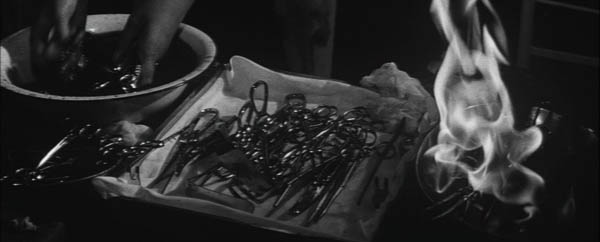One of the most stylishly shot courtroom dramas ever, beating Clouzot’s La Verite. Ayako Wakao, star of Seisaku’s Wife, is again the titular wife, again with marital problems. This time she’s defending herself in court, accused of self-widowing on a mountain climb so she could marry her lover and climbing buddy.

The facts are laid out right from the start: the married couple fell and Kouda was holding on, with Ayako in the middle and her husband dangling below. Kouda couldn’t pull them both up. She cut the rope below her, letting her husband fall to his death.

She testifies that she and her husband (Eitaro Ozawa: Minobe in When a Woman Ascends the Stairs, Kinichi’s dad in Kiss) were never in love, but he wouldn’t allow a divorce. Meanwhile young, ambitious Kouda (Hiroshi Kawaguchi, Kinichi in Kiss) is engaged to his best client’s high-haired daughter Rie, but is spending all his time with the accused Ayako.
Kinichi and his dad, in love with the same woman:

Rie testifies:

The court case continues, experts are called in, stories are told by witnesses, a flashback within a flashback, as they try to determine whether Ayako had to kill her husband in order to save her own life. It has become a wide-open secret that the two surviving climbers are in love, and the day before the verdict, they go to the beach together as the soundtrack plays haunted string music. The next day she’s proclaimed innocent.

Kouda is dumping his fiancee and marrying Ayako, but surprised that she’s so quick to start spending her life insurance windfall. He grills her, and finally we get to see the fateful climb, as she confesses that she took the opportunity to get rid of her hateful husband, then Kouda calls her a liar and runs back to Rie. Ayako poisons herself, and Rie gets the last word: “Mr. Kouda, you killed her. If she’s a murderer, you’re also a murderer. Goodbye. I won’t be seeing you again.”


Shot the year before Masumura’s Black Test Car, from the writer of three of Kurosawa’s most famous later films.
Berkeley: “combines the pessimistic observations of film noir with the sensuality that Masumura would pursue further in later films… an early film to deal openly with a woman’s feelings about sex… Within an unusually complex narrative structure, Wakao beautifully develops contradictory desires in her heroine – her lust to live and her wish to die – and somehow makes them one.” Rosenbaum: “A powerful metaphor for Japanese interdependence, this rope connecting the members of a romantic triangle is also tied, one might say, to Masumura’s major theme: the tragedy as well as the necessity of individual choice and desire in a highly interactive society.”














